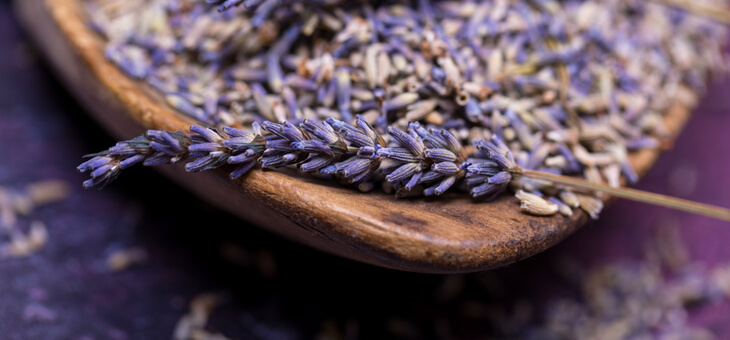When you think of lavender you probably think of its soothing scent. But lavender is a versatile herb that has many surprising uses.
The earliest recorded use of lavender dates back to ancient Egypt where it played a part in the mummification process.
In later times, lavender became a bath additive in several regions, including ancient Persia, Greece and Rome. These cultures believed that lavender helped purify the body and mind. Here are 10 surprising ways you can use lavender today.
Read: How to make a lavender sachet
It can soothe pain
Think about how you feel when you get a whiff of freshly cut grass or sniff a juicy orange as it’s being peeled. Scents such as these can often immediately lift your mood. So, it may come as no surprise to learn that certain aromas can calm nerves and alleviate pain.
According to a 2013 study, lavender essential oil may help treat pain in children after a tonsillectomy. Children who inhaled the scent of lavender were able to reduce their daily dose of acetaminophen post-surgery.
Lavender also contains polysaccharides. Another study, published in the journal Phytotherapy Research, found that plants containing these molecules are “the most potent in curing inflammatory diseases”, which includes arthritis and rheumatism.
It may promote hair growth
A 2016 study found that lavender oil applied to mice made them grow more hair, and the hair grew thicker and faster than normal. Human studies are needed but lavender oil rubbed on the scalp may stimulate hair growth. It can be safely applied to the scalp, and it smells great.
It improves overall scalp health
Lavender also has antimicrobial properties, which means it helps to prevent bacteria and fungi from growing. When applied to the hair or the scalp, it may prevent some common issues such as itchy scalp or dandruff.
A healthy scalp is essential to new hair growth, so this may also aid in promoting hair growth.
Read: How to make skincare products with plants from your garden
It enhances savoury dishes
Culinary lavender adds a clean sweetness to just about any dish. It also contains ursolic acid, a nutrient that may help fight cancer and reduce inflammation. Make your own delicious mixed herb seasoning with lavender, rosemary, thyme, fennel, chives, and other herbs.
Include lavender in meat marinades or rubs or substitute it for rosemary in entrees or vegetable dishes. When pruning lavender, toss the stems onto hot grill coals to infuse meat and vegies with a delicious, smoky, herbal flavour.
It enriches sweet dishes
Make lavender butter or sugar and use these to infuse the floral flavour into cookies or cakes. Or add dried lavender buds to tea for a floral burst. Lavender lemonade and sorbet are both very refreshing.
It can soak up toxins in the ground
Lavender thrives in toxic places that would quickly kill less hardy plants.
Several studies have found that planting lavender is an effective way to restore contaminated land, such as former mine sites, because it removes heavy metals and other pollutants from the soil. Even better, these contaminants don’t affect the quality of the lavender plant or its essential oil.
It freshens your floors
Grind two tablespoons of dried lavender buds and add to one cup of baking soda. Sprinkle onto carpets and leave for 30 minutes for it to work its magic. Once vacuumed, your carpets will be left smelling and looking fresh.
It may improve your memory
One study found that nursing students who took a sniff of lavender right before a test scored higher than their peers. Those test-takers retained more information, concentrated better, and were less anxious, but more studies are needed to confirm.
Read: Essential oils can benefit your health, mood and brain, study finds
It may help prevent falls
Unfortunately, lavender won’t soften your fall, but it might help to stop you from falling in the first place.
There is some evidence that attaching a pad with lavender oil onto the neckline of clothing reduces falls in nursing home residents. Residents in Japan who wore lavender patches every day for a year fell less often than those who went scent-free.
The authors of the study concluded that daily olfactory stimulation with lavender may prevent falls, but the definitive reason is unknown. Lavender’s traditional use of soothing anxiety and agitation may play a part. Previously demonstrated stabilising effects of lavender on balance also may be a factor.
It may be a good alternative to mothballs
Dried lavender is a popular natural alternative to mothballs, which contain toxic pesticides. The scientific data is a little sparse, but one study did find that lavender essential oil was an effective insecticide against a specific type of moth larvae. Fill small sachets with dried lavender and keep them tucked in your closet. Even if you don’t have a moth problem, your clothes will smell delightful.
Do you like the smell of lavender? Do you grow it at home? Why not share any other uses you have for lavender in the comments section below?
If you enjoy our content, don’t keep it to yourself. Share our free eNews with your friends and encourage them to sign up.

